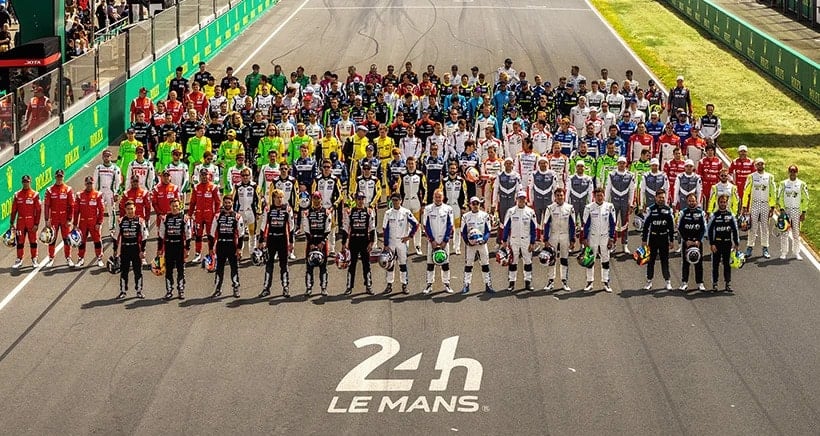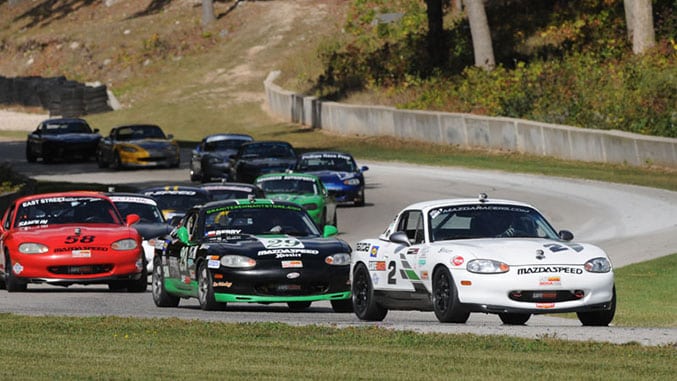Passing etiquette and new race cars are just some of the highlights of this week’s Racecraft & Race Cars Roundup.
In addition to passing etiquette, I bring you more racecraft tips and techniques including 3 tips to defending your position on track, braking techniques, using sim racing as a racecraft learning tool and more.
I also look at driver fitness, nutrition, and mental conditioning in addition to new race cars from Toyota and Marc Cars Australia.
All this and more in this week’s edition of the Racecraft & Race Cars Roundup on Motorsport Prospects.
Racecraft Tips & Techniques
On-Track

In the video above, real life GT racer as well as sim racer Daniel Morad explains the 3 steps to defending your racing position on track. “Learn how to defend your racing position like a pro and most likely crash less, I hope.”
Ross Bentley of Speed Secrets explains in his Hagerty Motorsports column how braking is not a matter of playing chicken. “To the casual observer of racing, the fastest driver is the one who wins the game of chicken: Who can brake the latest for the corners? Whoever brakes first should go back to the barnyard. The casual observer is wrong.”
Ross also answers the question in his Ask Ross column, How can I “test” for grip by turning the steering more in the middle of a corner on a race track?

In the video above, Samir Abid of Your Data Driven explain how telemetry data can help you drive faster.
“The ultimate goal, of course, is to drive faster and with greater consistency. After all, motorsports is all about that visceral, thrilling experience behind the wheel. Telemetry data promises to be the key to unlocking your potential, but it can be challenging to see how it fits into the bigger picture.”
In Part 8 of Tom Martin’s Guide to Road Racing, he looks at passing etiquette.
“Like many sports, racing has written and unwritten rules. And, just like other sports, it is the unwritten rules that can often get you in the most trouble or lead to the biggest misunderstandings. The problem with unwritten rules in racing, especially for new drivers, is that they are unwritten and thus are more difficult to learn. This article is designed to correct that issue, at least partially, by writing down some of the commonly encountered passing situations where unwritten rules apply.”
Speaking of passing etiquette and racecraft, Marcus Simmons of Autosport feels that there is a national motorsport track limits mess that needs to be cleaned up.
“When the proposed revision of track-limit regulations was declared across UK national motorsport, it was met with a poor reception. The situation has arguably worsened even before its official installment, and a new course of action is desperately needed.”

Scott Mansell of Driver61 looks to answer the question in the video above, Does Being Fast in the Sim, Mean Fast in Real Racing? It is an extremely informative look at the differences between sim racing and real world racing and how you can use sim racing as a tool to maximize your performance in real world racing.
Off-Track

The Hintsa Podcast Formula Why answers the question, Why Do Formula 1 Drivers Need to Be So Fit?
“The Formula Why podcast, hosted by Katie Osborne and Christian Hewgill, delves into various aspects of the sport with expert insights. In the third episode, Katie and Christian explore why F1 drivers need elite levels of fitness. Press play to hear Antti Kontsas, Head of Performance for Motorsport at Hintsa, racing scientist Dr. Diandra Leslie-Pelecky, and former F1 driver Alexander Rossi explain the extreme physical demands that F1 drivers face – and how the drivers cope with them.”
You can listen to the podcast here.
The Paddock Sorority interviewed author Danielle Simpson about her book Mindset Mission and how race drivers can use the techniques she outlines in her book.
While mental health is an area that is growing in the world of motorsport, there’s still a lot to be done and there can still be confusion over what working with a mindset coach actually involves. When collaborating with Danielle for this piece, she talked me through the process that she goes through with her clients:
“We always start by identifying where they are currently, as you cannot implement change if you are not aware of the current reality. Once that is established we then focus on reducing self- limiting beliefs and look at where these could have stemmed from. And finally understand the techniques such as meditation and journaling, and how they can help and improve a situation.
Then throughout the race season I support the client at track and online, having check in’s about how the season is going, how we can improve and focusing on what is going well.”
Danielle Simpson is Revolutionizing Motorsport with her Mindset Mission
Adults Play Sports looks at the importance of nutrition for adult athletes, regardless of the sport they play.
“So what are important aspects of diet and nutrition adult athletes should consider? I talked to Claire Wood of Nutrigility to find out. Claire has a master’s degree in nutrition and exercise physiology and is also a Registered Dietitian Nutritionist (RDN). As if that weren’t enough to lend to her credibility, she was also a Division 1 soccer player in college (George Washington University).”
Race Car & Series Developments

Autoweek looks into why driver ratings remain murky business for sports car racing. This is important as it goes to the economics of being a race driver and earning a living from motorsport.
“Why do series like IMSA rely on driver ratings? When there’s no manufacturer footing the bill, sports car racing is often funded by gentlemen drivers who buy the cars, pay for the teams and their co-drivers. Given the hefty sums involved, the gentlemen drivers want to race for victories on an equal footing with other teams.”
The FIA publishes driving ratings at fia.com/fia-driver-categorisation for nearly 4,000 drivers. “The initial categorization,” reads the web page, “is based on the driver’s age and career record, which may be adjusted in subsequent seasons according to the recorded race pace and results of the series that are using the categorization system.”

The production version of the car revealed at the Tokyo Auto Salon as the Toyota GR GT3 Concept early last year (see above), is set to be raced exclusively under the Lexus brand worldwide, Daily Sportscar has established.
“The new car, which is now in the initial track testing phase of its development in Japan, still hasn’t had its model name confirmed. It is set to be the replacement for the current (2017 vintage) Lexus RC F GT3 (below), including as the brand’s representative in the IMSA WeatherTech SportsCar Championship (potentially in GTD Pro and GTD) in the future.”

Geoff Taunton will reveal a brand-new Australian-made Marc GT car at Phillip Island this weekend when he lines up for the Fanatec GT World Challenge Australia powered by AWS. “Bult by Marc Cars Australia, the car is cost-effective and driver-friendly that caters to both experienced and grass-roots competitors, having been an upgrade from the Marc Focus and Mazda launched in the last decade.”

FEL Motorsports has announced that they have two Hyundai Veloster TCA racecars for sale to compete in the Sports Car Championship Canada presented by Michelin. The acquisition was intended to eliminate the challenges of importing a racecar, and offer ownership via one single transaction. These cars are currently in Canada and are available for immediate sale. Interested buyers should call Chris Bye for details on pricing.
More details can be found here.

